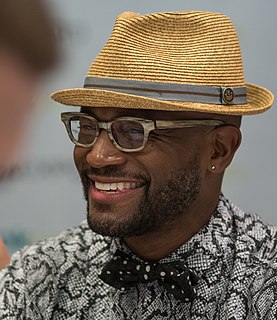A Quote by Amy Cuddy
Even more dramatic, Alex Todorov at Princeton has shown us that judgments of political candidates' faces in just one second predict 70 percent of U.S. Senate and gubernatorial race outcomes, and even, let's go digital, emoticons used well in online negotiations can lead to you claim more value from that negotiation. If you use them poorly, bad idea. Right? So when we think of nonverbals, we think of how we judge others, how they judge us and what the outcomes are. We tend to forget, though, the other audience that's influenced by our nonverbals, and that's ourselves.
Quote Topics
Alex
Audience
Bad
Bad Idea
Candidates
Claim
Digital
Dramatic
Even
Faces
Forget
Go
How
Idea
Influenced
Judge
Judgments
Just
Just One
Lead
More
Negotiation
Negotiations
Online
Other
Others
Our
Ourselves
Outcomes
Percent
Political
Political Candidates
Poorly
Predict
Princeton
Race
Right
Second
Senate
Shown
Tend
Them
Think
Though
Us
Use
Used
Value
Well
Related Quotes
It is our genetic nature as a species to believe as young children that our parents and elders are right. We watch them to see what's what. Later on we can judge for ourselves and rebel if need be, but when we're just months old, or a year or two, and a parent looks at us with impatience, or disgust, or disdain, or just leaves us there to cry and doesn't answer us even though we're longing to be embraced and nurtured, we assume that something must be wrong with us. Unfortunately, at that age it's impossible to think there might be something wrong with them.
But who can foresee such things? None of us can predict the final outcomes of our actions, and few of us even try; most of us just do what we do to prolong a moment's pleasure or to stop the pain. And even when we act for the noblest reasons, the last link of the chain all too often drips with someone's blood.
Most people use two totally different sets of criteria for judging themselves versus others. We tend to judge others according to their actions. It's very cut-and-dried. However, we judge ourselves by our intentions. Even if we do the wrong thing, if we believe our motives were good, we let ourselves off the hook. And we are often willing to do that over and over before requiring ourselves to change.
Unfortunately, the business is such that, as far as studios are concerned, they judge one quote-unquote black movie on how other ‘black’ movies have done, even if they have nothing to do with each other It’s too bad we can’t do well on our own merit when it comes to the studios. They don’t like to take risks and, unfortunately, we’re still considered a huge risk, even though I don’t think we are.
Our own personal salvation is to say, "I'm not going to judge myself, or let other people judge me, by my economic worth." We can't, obviously, control how other people will judge us, but - Life's too short to worry about those things. We can't control those things, but we can control how we feel about ourselves. And we work towards that. To say, "My life has been a success. Even if my bank account doesn't indicate it."
Things and persons appear to us according to the light we throw upon them from our own minds. How unconsciously we judge others by the light that is within ourselves, condemning or approving them by our own conception of right and wrong, honor and dishonor! We show by our judgment just what the light within us is.
We have to find a way of understanding how one category of sex can be "assigned" from both and another sense of sex can lead us to resist and reject that sex assignment. How do we understand that second sense of sex? It is not the same as the first - it is not an assignment that others give us. But maybe it is an assignment we give ourselves? If so, do we not need a world of others, linguistic practices, social institutions, and political imaginaries in order to move forward to claim precisely those categories we require, and to reject those that work against us?
I'd love if Google ran my cable or phone company. Instead of making their businesses out of telling us what we can't do, GT&T would recognize the benefit of helping us do what we want to do: use the internet more and create more of our own stuff. Google might even figure out how to make connectivity ad-supported and free. Sadly, though, I think Google knows what it is and won't expand into other industries, even if it would be good at running a cable or energy or phone company.
You know, artists are influenced by other artists. We're all deeply influenced by what's around us; we don't make anything cold. Sometimes we think that we do. But within that, the most important part is that even though we're influenced, what are the levels of invention that we carry forth even as we've been influenced by something that's come before?
We know that global capitalism, and the commercially driven culture that comes with it, can be a powerful solvent, but many of us who benefit from it economically can regret the effect it has on our own lives as well as on the lives of others, and we should not view ourselves as helpless in the face of an irresistible force, especially since we may very well be complicit. We should be prepared to help others or to leave them be to sustain their cultures if we judge that they are of intrinsic value or of value to their members.




































